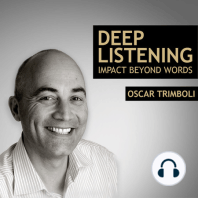4 min listen

how to listen when you want to solve
how to listen when you want to solve
ratings:
Length:
11 minutes
Released:
Jul 15, 2022
Format:
Podcast episode
Description
David, it was great to speak to you on the phone and I hope that my referral to Joey helps you progress your question around the auditory processing issues that you encounter and how that shows up really differently in one-on-one conversations and how shows up in group discussions for you when you move from tuned-in to really fuzzy auditory processing in groups Listening is a simultaneous equation between the speaker and the listener. When auditory processing issues are present, make the implicit explicit. Communicate about what effective communication means for you. One of my past managers, Tony, role modeled this well. He had an issue with his left ear and he would explain his hearing difficulty to every group meeting he would participate in when he knew somebody new was in the meeting. I discussed this with Tony on a long-haul flight across the Pacific, and he didn't enjoy repeating it, but he said to me, "It's better than creating the impression that you're ignoring people." And I've seen this myself working with an executive team and people were saying that the leader in the room, "She's ignoring us Oscar. She's always looking down at the ground when we're speaking." In that moment, I invited the leader to explain, she said to the group, "I concentrate much better on what you're saying when I'm not visually distracted, I'm not ignoring you, I'm focusing all my efforts on making sure I'm hearing everything that you're saying." And that moment you could hear a very audible sigh in the room from every participant. It was a breakthrough moment that happens if you communicate about how you communicate. We over-read body language and this is a perfect example of not asking that question Thanks to Rane who commented with her question? How can we encourage people to listen instead of concentrating on their comeback? Listening is a simultaneous equation and we give great listening that becomes an example for others to learn and improve from. Rane, I promise you a full deconstruction of how I'd approach a conversation where everybody's busy, reloading their arguments rather than, listening. It makes listening really light and easy to sustain. And my listening batteries, aren't drained by the intensity of juggling multiple layers in the conversation yesterday. Marc asked Oscar, "I've got questions about the questions and Marc asked, would you share the questions?" I'm delighted to share, these are the questions, and we'll be sharing all these questions with everyone, that's the purpose of this listening challenge to share these questions with everybody out there. So thanks for your engagement there. Please keep the comments and the questions coming.. Today's listening question, this question comes from Kerrie. She asks Oscar; "What I struggle with in my listening is listening to the whole problem or the whole conversation, because you know, all I'm thinking about is how do I solve it? I think this is a problem. I don't help the speaker solve their own problems and this creates extra effort for me. Typically, I jump in and give an answer, which Kerrie says exactly doesn't help me or them. " Kerrie, here's my invitation for you Ask this question at the beginning of the conversation. This will take the weight off your superhero-solving capacity. What would make this a great conversation for you? Or What outcome would you like to achieve at the end of our conversation? They might not want a solution. They might just want to thinking partner. They might just want to express an idea. Extroverts love to think by speaking, we don't give them the opportunity to do that. Allow them to express their thinking verbally, rather than jumping in to try and fix the issue. When you agree the outcome of the conversation, you can use that as a navigational setting, like a compass setting and that'll help you progress and check-in. And ask yourself this question, Kerrie, given that compass setting, rather than
Released:
Jul 15, 2022
Format:
Podcast episode
Titles in the series (53)
How to listen when they hold strong views?: Answer My Questions #AMQ by Deep Listening - Impact beyond words - Oscar Trimboli